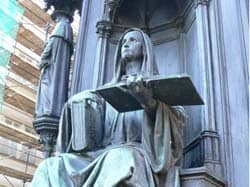By Star Foster
 Let us talk about the Gods. That's all theology really means: talking about Divinity. The word theology has become strongly identified with Abrahamic faiths, and Pagans tend to equate it with orthodoxy and therefore anathema to many Pagan religions. The limits of the English language, with regards to polytheism, make this negative reaction understandable. (In this article the words Divine and Divinity are used as plural nouns.) However, these perceptions are changing and Pagans are taking on the unique challenges of applying theology to a plural, diverse religious movement.
Let us talk about the Gods. That's all theology really means: talking about Divinity. The word theology has become strongly identified with Abrahamic faiths, and Pagans tend to equate it with orthodoxy and therefore anathema to many Pagan religions. The limits of the English language, with regards to polytheism, make this negative reaction understandable. (In this article the words Divine and Divinity are used as plural nouns.) However, these perceptions are changing and Pagans are taking on the unique challenges of applying theology to a plural, diverse religious movement.
How do we talk about theology in a pluralistic way? I think the answer lies in how we perceive Divinity. If we consider Divinity to be objective, that is, as if anyone properly educated would perceive Divinity in the same way, then we fall into the same line of thinking as monotheistic and "One True Way" traditions. To even begin to consider a Pagan theology we must completely put away the idea of an objective Divinity.
Take a deep breath. I'm not suggesting it's just all in your head, although as Lon Milo DuQuette says "you have no idea just how big your head is." Why put away the idea of Divinity as an objective entity in theological discussion? Thousands of years of human evolution has shown that while human experiences of Divinity may have commonalities, particularly among humans who share a common region or culture, there is no consensus on the nature of Divinity. Our experiences are widely varied and even among those who share a religious tradition there can be marked differences in the experience of Divinity.
These differences are often chalked up to humankind's inability to truly understand the Divine.
The problem with this theory is that if we are truly incapable of understanding the Divine, yet continue to try, this makes humanity perpetually stupid, if not insane. We have been seeking to understand the Divine since we were scrawling on cave walls and presumably felt the Divine reach out to us for just as long. If the Divine is reaching out to us, knowing we can never hope to understand them, then are we being toyed with? Treated as infantile? Being used? While I am not saying that there may not be a Divinity that is somewhat manipulative, or even possibly malevolent, the answer to this question in the heart of every person who seeks the Divine is a resounding No!
Ah, but that's a purely subjective answer, you say. Indeed it is, because I feel the only productive way to talk about the Divine is as if they are subjective. The Divine exist independently of us. No two humans perceive the Divine in the exact same way, and some do not even perceive the Divine at all. The idea that understanding the Divine is impossible makes approximately 200,000 years of human evolution absurd, as we as a species have devoted considerable time and effort to understanding the Divine.
How do we resolve this paradox? Well, as a loose collective of religions we generally agree that there are many paths to the Divine. Why is this? Aside from the intricacies of polytheism, if the Divine exist independently of us, then surely there must be a best way to approach them, to perceive them. Some way more pleasing and efficient than the rest? I think the reason there are many paths to the Divine is that each of us is equipped to interact with the Divine differently.
In the 200,000 years of human evolution, our perceptions of and interactions with the Divine have grown increasingly more diverse and intricate. In the beginning it appears we were mainly animistic, worshiping the forces of nature that surrounded us. As we evolved, so did our perception of the Divine. Now, it is possible the Divine were also evolving and this fed the exponential growth of religious expression, but that doesn't explain why humans have differing perceptions of the Divine.
What might explain the paradox is that we are not identically equipped to interact with the Divine. Our DNA, environment, experiences, and our spirit/soul all combine to create a highly unique individual. No two humans are exactly alike in their views or in their fingerprints. Twins may have the same childhood experiences, go to the same schools, study the same subjects and yet have very different opinions, preferences, and perspectives as adults. They are equal yet different.
The equal part is very important. Just as no path to the Divine is better than another, neither is "no path" to the Divine any less for its lack of Divine experiences. Just as the unique constellation that makes you unique may lead you to Odin, Jesus, or Shiva, so that within you that brings you to atheism or agnosticism is just as valid and important in the landscape of human religious thought and practice.





